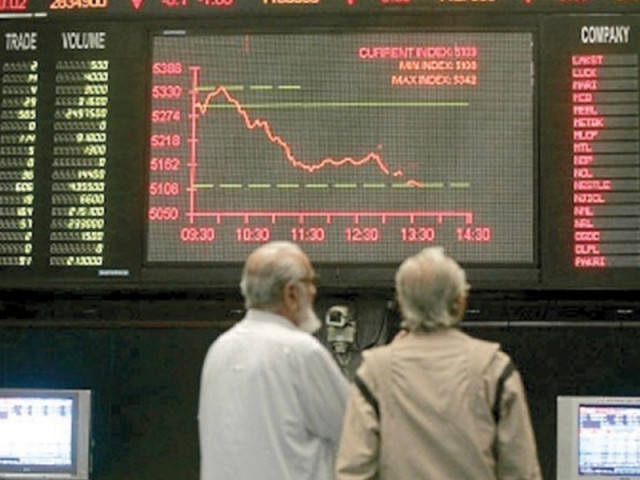Patterns reflect why small investors fare worse at KSE
Investment in small-cap stocks is risky due lack of information, unstable financials.

Small investors think it is easier to make money in stocks currently trading at Rs20 a share than those trading at Rs200. Hence, they usually end up trading in small-cap stocks, which are more risky. PHOTO: FILE
The Karachi Stock Exchange (KSE) has gone from being one of the best performing stock markets of the world in the first seven months of 2013 to the worst performing regional market in September when it registered a month-on-month decline of 4.8% in the Frontier Market Index.
There have been a number of downturns and upturns on the KSE in recent months. On the face of it, the benchmark KSE 100-share Index recovers to a certain extent after every correction. But if you take a closer look at the individual stock prices, a certain pattern emerges, which points to the hammering of retail investors only.
For example, the KSE 100-share Index decreased 8.3% between August 15 and September 2, which is one of the sharpest declines that the benchmark index has undergone in recent years.

However, compared to the overall decline of 8.3%, prices of the stocks in which small investors usually trade declined by up to 34% between August 15 and September 2.
Let’s take a few examples. Highly liquid and relatively cheaper stocks, such as Cherat Cement, Jahangir Siddiqui and Company, and Karachi Electric Supply Company decreased 32%, 34.7% and 21%, respectively, between August 15 and September 2.
On the other hand, the decrease in share prices of Nestle Pakistan, Pakistan Tobacco and United Bank was a meagre 1.3%, 0.9% and 0.7%, respectively. Other notable examples included National Bank of Pakistan (19.2%), Lafarge Pakistan Cement (18.2%), Pakistan Petroleum (5.6%), Indus Motor Company (5.5%) and Lucky Cement (5.1%).
This leads to two questions: one, why do some stocks go down massively during a correction while others remain relatively unscathed? And two, how does this phenomenon affect retail investors?
“Small investors usually avoid stocks of large and stable companies because these stocks are expensive. They think it is easier to make money in stocks currently trading at Rs20 a share than those trading at Rs200. Hence, they usually end up trading in small-cap stocks,” said Elixir Securities Head of Research Azfer Naseem while speaking to The Express Tribune in a recent interview.
To be fair, there is indeed a higher chance of making, for example, 50% gain in a small-cap stock. But Naseem says it comes with a much higher degree of risk. “Small-cap stocks are not blue-chip companies and generally have an uncertain and highly fluctuating earnings profile. Moreover, their earnings are also difficult to forecast, so there is a lot of uncertainty about how much these stocks are actually worth,” Naseem added. The result is obvious: when overall market undergoes a correction, prices of such stocks fall by a much higher proportion, he noted.
It can be said that established businesses with stable profitability have not seen massive declines in their share prices as opposed to those companies whose business models are volatile. Naseem says institutional investors do not trade in small-cap companies, which means their price discovery mechanism is not particularly strong. Hence, prices of such stocks also declined massively, he said.
Moreover, when the overall market undergoes a correction, he says, investors with leveraged positions receive margin calls from brokers, which further depress stock prices.
In simple words, they have to put up additional money as guarantee, if they fail to then brokers are bound to sell the stocks as per the regulatory requirements. “It’s only retail investors who get affected because mutual funds and banks do not take leveraged positions,” Naseem noted.
In order to avoid getting hammered, Naseem says small investors should stay away from investing in such stocks. “These stocks are not just risky. Small investors are at an informational disadvantage due to their small investment amounts.”
Calling the price war among brokers – some of them do business even on zero commission – ‘disastrous,’ he added that retail investors cannot expect good service, let alone sound investment advice, from brokerage houses with such a low commission rate.
“Small investors cannot invest a lot of time and money in researching, and as such, mostly suffer losses in the long run. This is the case not only in Pakistan, but also in India, Bangladesh and Sri Lanka,” he said.
Published in The Express Tribune, October 3rd, 2013.
Like Business on Facebook, follow @TribuneBiz on Twitter to stay informed and join in the conversation.



















COMMENTS
Comments are moderated and generally will be posted if they are on-topic and not abusive.
For more information, please see our Comments FAQ